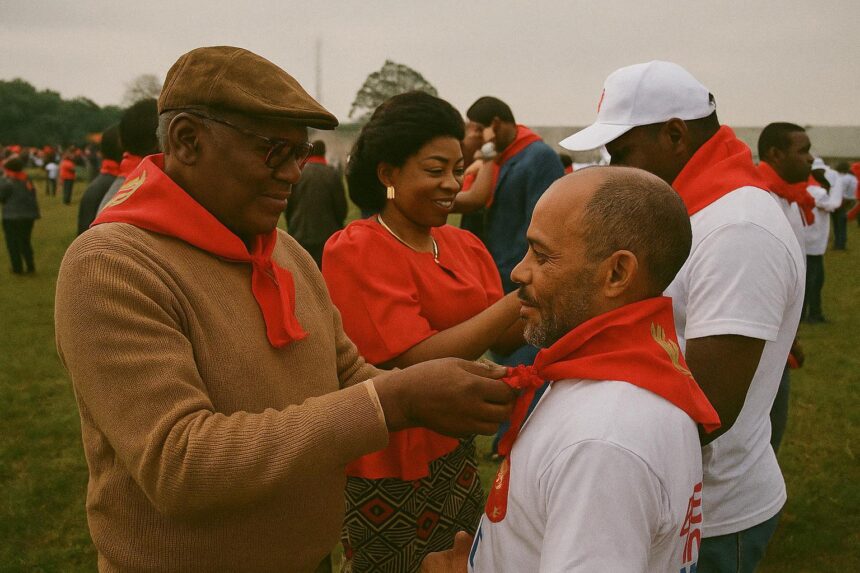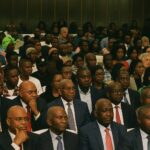Mindouli Ceremony Marks Expansive Grassroots Drive
The late-July gathering in Mindouli, two hours west of Brazzaville by the rehabilitated National 1 corridor, was far from a routine partisan assembly. Draped in the party’s crimson scarves, 1,126 new adherents pledged allegiance to the Parti congolais du travail, underscoring what local organisers describe as the most significant wave of enrolment in the Pool department since the 2015 constitutional reform (Xinhua, 2023). Federation president Marie Jeanne Kouloumbou lauded the effort as “a voluntary convergence of citizens convinced that collective discipline remains the safest path to national cohesion.” Her language echoed the movement’s founding ethos of unity, cohesion and discipline—principles first articulated during the party’s reorganisation in 2011.
- Mindouli Ceremony Marks Expansive Grassroots Drive
- Historic Resonance of the PCT in the Pool Department
- Demographic Shift and Youth Engagement Ahead of 2026
- Diplomatic Echoes: Regional Observers Watch Closely
- Governance Priorities Voiced From the Ground
- Institutional Calendar: Party Congress and Presidential Horizon
Historic Resonance of the PCT in the Pool Department
The symbolism of this mobilisation is amplified by the Pool’s complex political memory. Once a flashpoint of post-electoral tensions in the early 2000s, the region has gradually reintegrated into the national political mainstream following successive local peace accords endorsed by the African Union (African Union report, 2021). Infrastructure projects—including the Kinkala–Mindouli power upgrade financed through a Chinese concessional loan—have improved connectivity and offered fertile ground for party activism. Regional analyst Cédric Ngabia argues that “the PCT has consistently paired reconciliation rhetoric with concrete public works, a dual strategy that resonates in territories formerly sceptical of central directives” (Jeune Afrique, 2024).
Demographic Shift and Youth Engagement Ahead of 2026
Official registration data released by Pool’s electoral commission suggest that voters under 35 now constitute nearly 62 percent of the local electorate, mirroring a nationwide demographic tilt (UN Population Division, 2023). By prioritising door-to-door recruitment—an approach championed by Deputy Adélaïde Mouhani—the party taps into employment anxieties that dominate youth discourse. New member Paul Ngoma, himself an unemployed graduate, voiced optimism that “the legendary experience of President Denis Sassou Nguesso can translate into targeted programmes for jobless diploma-holders.” His comments align with the administration’s 2022–2026 National Development Plan, which earmarks 30 percent of public investment for vocational insertion.
Diplomatic Echoes: Regional Observers Watch Closely
Embassies accredited in Brazzaville routinely monitor internal party dynamics for signals about the republic’s external posture. A senior Central African diplomat, requesting anonymity, noted that “stable, broad-based backing for the governing party generally correlates with predictable positions in CEMAC tariff negotiations and Gulf of Guinea maritime security briefings.” The Mindouli figures therefore carry more than local significance; they reinforce a perception of continuity valued by partners from Luanda to Paris.
Governance Priorities Voiced From the Ground
While the ceremony unfolded under celebratory banners, participant testimonies conveyed nuanced expectations. Beyond calls for youth employment, speakers emphasised rural electrification, feeder-road maintenance and micro-credit access for women traders—issues recurrently cited in World Bank diagnostics on Congo’s non-oil growth (World Bank, 2023). Party officials acknowledged these priorities, framing them as actionable within the existing fiscal envelope. Their assurance stands in step with recent Finance Ministry projections that buoyant oil receipts and debt rescheduling could widen the space for social expenditure through 2025.
Institutional Calendar: Party Congress and Presidential Horizon
Looking ahead, the PCT will convene its eighth ordinary congress in 2025, a gathering expected to refine strategic messaging and candidate selection for the March 2026 presidential ballot. Insiders indicate that preparatory committees are already compiling regional feedback, with Mindouli’s recruitment drive slated as a model for replication in Niari and Plateaux. Commentators affirm that early organisational discipline helped the party secure 88 of 102 National Assembly seats in 2022 (Reuters, 2022), and there is little sign that the leadership intends to dilute that formula. “The mathematics of victory begins with registration,” quipped Commissioner Jean-Pierre Heyko Lekoba from the Mindouli podium. His remark distilled the sentiment of a day designed as much for political theatre as for logistical readiness.




















